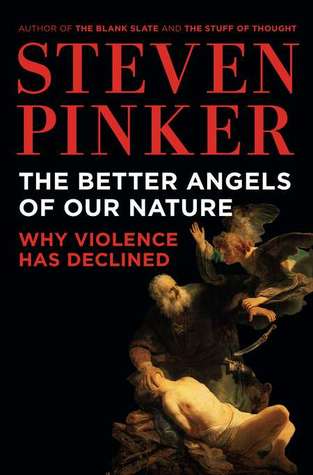Violence Must be Considered Proportionally When Compared to the Past
In absolute numbers, of course, civilized societies are matchless in the destruction they have wreaked. But should we look at absolute numbers, or at relative numbers, calculated as a proportion of the populations? The choice confronts us with the moral imponderable of whether it is worse for 50 percent of a population of one hundred to be killed or 1 percent of a population of one billion. In one frame of mind, one could say that a person who is tortured or killed suffers to the same degree regardless of how many other people meet such a fate, so it is the sum of these sufferings that should engage our sympathy and our analytic attention. But in another frame of mind, one could reason that part of the bargain of being alive is that one takes a chance at dying a premature or painful death, be it from violence, accident, or disease. So the number of people in a given time and place who enjoy full lives has to be counted as a moral good, against which we calibrate the moral bad of the number who are victims of violence. Another way of expressing this frame of mind is to ask, “If I were one of the people who were alive in a particular era, what would be the chances that I would be a victim of violence?” The reasoning in this second frame of mind, whether it appeals to the proportion of a population or the risk to an individual, ends in the conclusion that in comparing the harmfulness of violence across societies, we should focus on the rate, rather than the number, of violent acts.
Notes:
Folksonomies: violence quantification
Taxonomies:
/society/unrest and war (0.287154)
/health and fitness/disease (0.259603)
/hobbies and interests/games/lottery (0.170318)
Keywords:
absolute numbers (0.919774 (neutral:0.000000)), violence (0.739598 (negative:-0.359577)), civilized societies (0.731309 (negative:-0.373977)), moral imponderable (0.693037 (negative:-0.845040)), analytic attention (0.648240 (negative:-0.715576)), moral good (0.647844 (positive:0.487538)), painful death (0.643946 (negative:-0.425256)), relative numbers (0.640864 (negative:-0.250692)), violent acts (0.622124 (negative:-0.494383)), particular era (0.619196 (neutral:0.000000)), frame (0.608633 (positive:0.351874)), mind (0.508365 (positive:0.351874)), population (0.500806 (negative:-0.845040)), proportion (0.460100 (negative:-0.470817)), people (0.440525 (negative:-0.073187)), percent (0.413059 (negative:-0.845040)), sufferings (0.321210 (negative:-0.715576)), sympathy (0.310145 (negative:-0.715576)), bargain (0.308373 (negative:-0.425256)), suffers (0.306126 (negative:-0.560725)), destruction (0.303598 (negative:-0.373977)), sum (0.301566 (negative:-0.715576)), conclusion (0.301086 (negative:-0.373242)), chances (0.300190 (negative:-0.256703)), populations (0.296710 (negative:-0.470817)), Past (0.295276 (neutral:0.000000)), course (0.295081 (neutral:0.000000)), fate (0.295045 (negative:-0.560725)), victim (0.289145 (negative:-0.256703)), reasoning (0.287414 (neutral:0.000000))
Entities:
50 percent:Quantity (0.010000 (neutral:0.000000)), 1 percent:Quantity (0.010000 (neutral:0.000000))
Concepts:
Suffering (0.977379): dbpedia | freebase | opencyc
Torture (0.627839): dbpedia | freebase | opencyc
Psychology (0.558031): dbpedia | freebase | opencyc
Violence (0.551072): dbpedia | freebase
Demography (0.491516): dbpedia | freebase | opencyc
Conclusion (0.479420): dbpedia
Philosophy (0.465673): dbpedia | freebase | opencyc
Pain (0.436285): dbpedia | freebase





